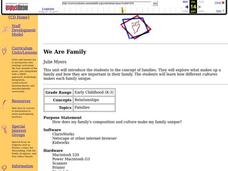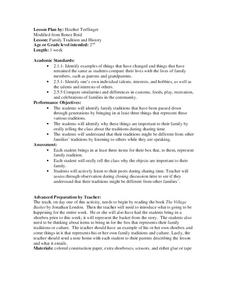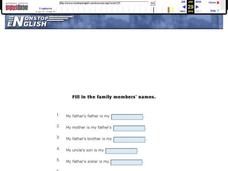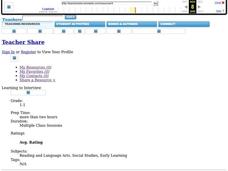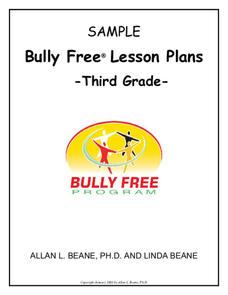Curated OER
Family Fitness Night
Students invite their family members to participate in a family fitness night at the school to encourage fitness and to promote and inform parents about physical fitness testing. They use a map of the school to locate the different...
Curated OER
The Body - Describe Your Family
For this ESL activity worksheet, students describe 4 family members on the lines provided and then draw pictures of the 4 family members.
Curated OER
Family Exercises
In this family worksheet, students fill in the missing words to sentences and choose the correct words to complete a song all about family. Students complete 14 problems total.
Curated OER
We Are Family
Students explore art and stories that depict families in different cultures. They examine how family members help each other, create traditions, have fun and change or grow. They describe their own families and create a class family...
Curated OER
Family Size
In this family size worksheet, students complete a tally chart to determine data from a family size line plot. They organize the data in the chart to determine the mean, median, mode, and range of the data. There are six problems in...
Curated OER
Family traditions
Second graders discuss family traditions. In this family tradition lesson plan, 2nd graders identify traditions in their family that have been passed down and bring in 3 things to share that have to do with these traditions. They...
Curated OER
Family Responsibility and Commitment
Students are introduced to Picasso and how he created Baboon and Young, and interpret the expressive content of the work. They discuss and define what a family unit consists of, and form conclusions of their own. Students identify and...
Curated OER
Family Relationship Names
In this family relationship names worksheet, students complete sentences by filling in the relationship given in the sentence.
Curated OER
Brain Teaser - Family
In this logic worksheet, learners solve a word problem using logic about a family crossing a river. Students complete 1 problem total.
Curated OER
Sexually Transmitted Diseases - Day 5: Communication
How does one have a discussion with a partner about a sexually transmitted disease? This is probably not a conversation that happens to be in everyone's repertoire. This instructional activity presents some role-playing scenarios that...
Smithsonian Institution
Dia de los Muertos: Honoring our Ancestors Through Community Celebration
Oral storytelling has been an important part of every culture. The time-honored practice uses stories as a conduit for a culture's values and customs from one generation to the next. Keep the tradition going with a family interview...
Curated OER
Family Members Worksheet
Students study family members. In this writing lesson, students say and write the names of various family members. Students also draw lines matching pictures to the names of family members.
Curated OER
Learning to Interview
An authentic and engaging way to practice literacy skills, this lesson calls for young language arts pupils to conduct interviews with classmates and family members. First, pupils watch as the teacher models the interview process with a...
Curated OER
Child Adolescent Sexual Development: Infant and Preschool
This is a very comprehensive instructional activity on infant and preschool sexual development. It says only one class period, but I think it could be several days worth of materials to cover. The point of view taken here is from that of...
Curated OER
Communication, Day 5: Saying "No"
There are many ways to say, no. Secondary special needs students need to know when and how to say no when they feel they are in an uncomfortable situation. They sign, say, and role-play how to say no. Worksheets and role-playing cards...
EduGAINs
Migration—Push and Pull Factors
What causes people to move from one place, one city, or one country to another? Using the provided migration questionnaire, learners interview family members about the factors that cause them to be pushed from an area or pulled to...
Fox Valley Unitarian Universalist Congregation
Conflict Resolution
Many teenagers struggle with resolving conflicts with peers, friends, or family members. Here's a form that can guide them through the steps they need to take to identify the problem, their contribution to the problem, and their...
Bully Free Systems
Bully Free Lesson Plans—Third Grade
Two lessons shed light on two types of bullying: verbal and cyberbullying. After defining the two types, scholars take part in whole-group discussions, complete worksheets, and write reflections. A parent or guardian chat encourages an...
US Department of Commerce
Creating and Taking a Survey
Individuals learn how to conduct surveys and collect data for the class on age, pets, and number of people at home. Scholars compare their household size to the information in the census. Pupils then develop additional questions to ask...
Teaching Tolerance
Picture Books
Aspiring artists and budding writers combine their skills in an interactive lesson. Young scholars become authors when they create their own picture books focused on social justice. The resource guides learners through the writing and...
Teaching Tolerance
Puppet Show
It's a play, it's a story, it's a puppet show! A lively resource provides academics with a creative outlet to express their views on diversity and social justice. Scholars are responsible for writing, creating, and performing a puppet...
Angel Island Immigration Station Foundation
Interrogation of Immigrant
Imagine being interrogated by someone you don't know about minute details of your life. Imagine that the interrogator is matching your responses to the answers of other family members. Imagine how you would feel knowing that the...
Curated OER
Abigail Adams and Thomas Jefferson
In addition to her letters to her husband, family members, and friends, Abigail Adams also wrote to key political figures of the time. In this lesson, scholars examine letters Adams' wrote to and received letters from Thomas Jefferson...
Curated OER
WANTS VS. NEEDS
Students gain an appreciation for wants and needs by analyzing poems, researching spending choices on the internet, interviewing family members, and create power point slides.



